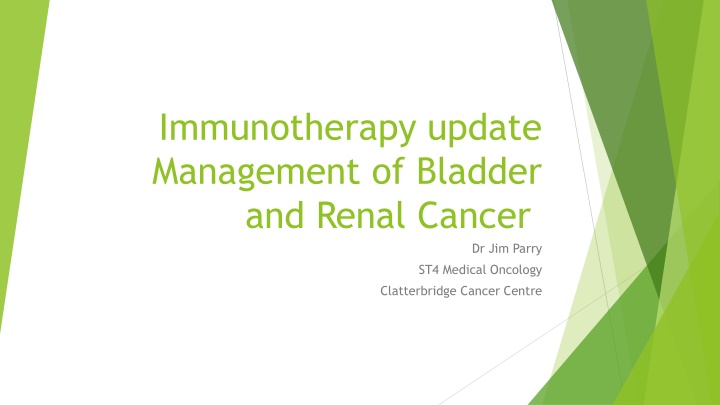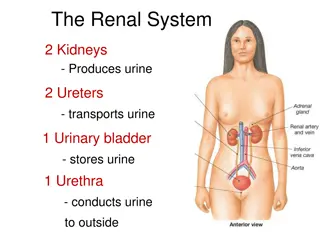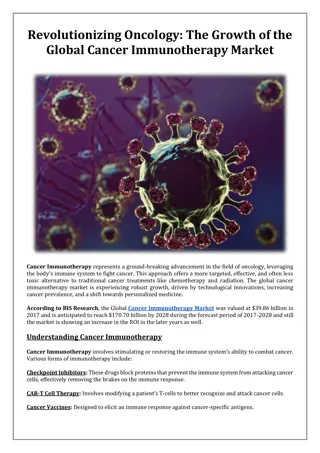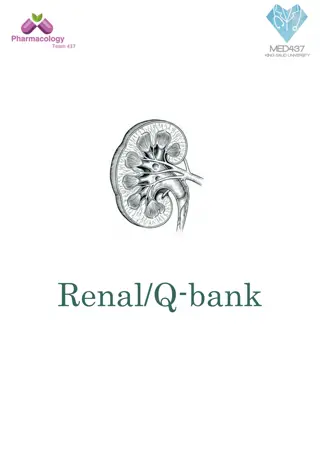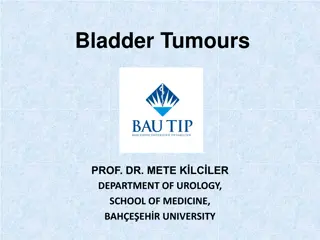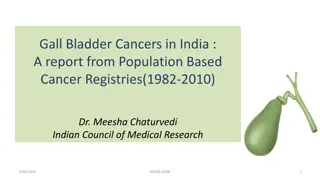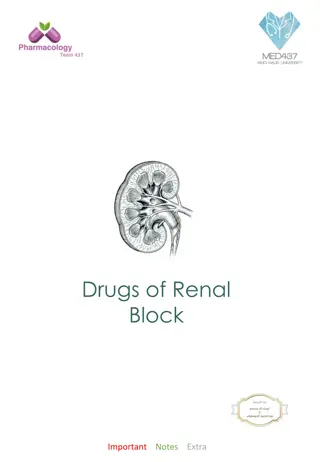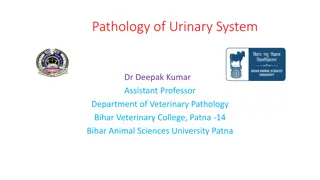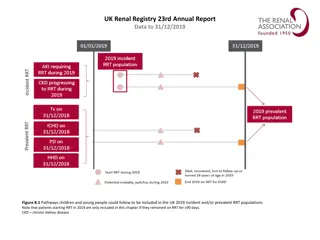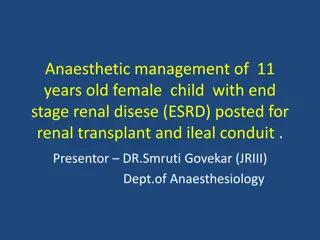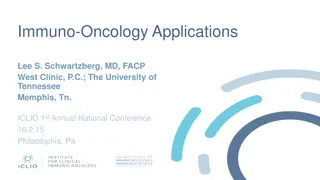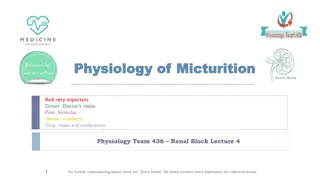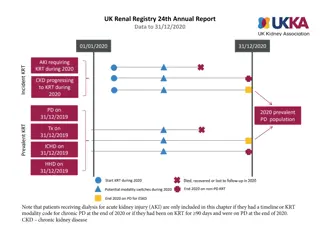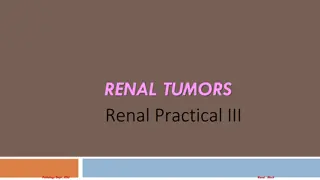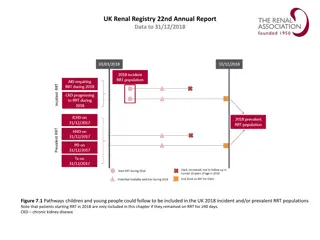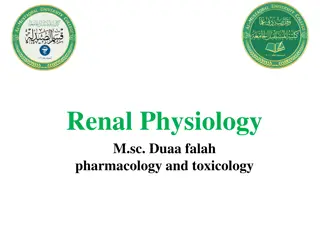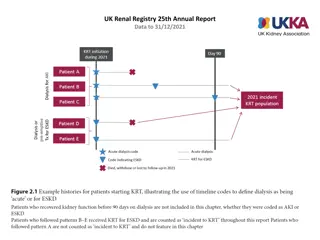Comprehensive Overview of Immunotherapy in Bladder and Renal Cancer Management
Explore the latest advancements in immunotherapy for managing bladder and renal cancer, including mechanisms of action, indications, adverse effects, and available treatment regimes. Learn about immune checkpoint inhibitors, differentiating immunotherapy from chemotherapy, indications for use across various malignancies, and the evolving landscape of immunotherapy in cancer treatment.
Download Presentation

Please find below an Image/Link to download the presentation.
The content on the website is provided AS IS for your information and personal use only. It may not be sold, licensed, or shared on other websites without obtaining consent from the author.If you encounter any issues during the download, it is possible that the publisher has removed the file from their server.
You are allowed to download the files provided on this website for personal or commercial use, subject to the condition that they are used lawfully. All files are the property of their respective owners.
The content on the website is provided AS IS for your information and personal use only. It may not be sold, licensed, or shared on other websites without obtaining consent from the author.
E N D
Presentation Transcript
Immunotherapy update Management of Bladder and Renal Cancer Dr Jim Parry ST4 Medical Oncology Clatterbridge Cancer Centre
Immunotherapy; mechanism of action, indications, adverse effects Management of bladder cancer Management of renal cancer
Immunotherapy a wide field Immunotherapy Monoclonal Antibodies Oncoolytic virus therapy Non-specific Immunotherapy T-Cell Therapy Cancer Vaccines Checkpoint Inhibitors Interferons CTLA4 ipilimumab interleukins PD1 nivolumab pembrolizumab PD L1 atezolizumab
What is Immunotherapy? Tumours express "checkpoint" proteins on their cell surface to escape detection from the immune system; targeted inhibition towards these receptors enhances T-cell response towards the tumour, these treatments are called Immune Checkpoint Inhibitors [ICI].
Why/how is IO different from chemotherapy/SACT? Immuno-Oncology (IO) given every 3 4 weeks for up to 2 years (as opposed to up to 4 6 cycle courses) in the best supportive care setting IO Adjuvant therapy can be given for up to a year IO s often have a delayed onset of effect (as it is the T-cells not the drug producing the effect) Withdrawal of the drug may not lead to cessation of efficacy or toxicity Less infusion issues compared to chemotherapy/SACT Different toxicities . Drugs stimulate T-cells after which we have no external control over subsequent efficacy/toxicity 1 It can become a perpetuating cycle Does not terminate spontaneously SACT, Systemic Anti-Cancer Therapy 1. Li. Protein Cell 2017
Indications for use Melanoma Upper GI Malignancies NSCLC Triple negative Breast Cancer Renal Cell Carcinoma Immunotherapy 3040 Clinical Trials Urothelial Malignancies Head and Neck Malignancies Merkle Cell Carcinoma Hodgkin Lymphoma
Available regimes - current Chemo/IO Ipilumumab Carboplatin/Pemetrexed/Pembrolizu Pembrolizumab mab Nivolumab Carboplatin/Paclitaxel/Bevacizumab/ Atezolizumab Atezolizumab Cemiplimab Carboplatin/Etoposide/Atezolizumab Avelumab Carboplatin/Paclitaxel/Pembrolizuma b Durvalumab Abraxane/Atezolizumab Tremelimumab TKI/IO Avelumab/Axitinib
IO at The Clatterbridge Cancer Centre June- Dec 2016 Time period 250 2017 2018 2019 Total numbe r of new starter s 200 150 64 347 452 620 100 50 0 June-December 2016 January-June 2017 July-December 2017 January-June 2018 Total Melanoma Lung Olsson-Brown et al Accepted for presentation ESMO Immuno-oncology 2018
Grade 3-4 Reactions: irAE s CTLA-41 PD-1/PD-L11 Combination treatment (CTLA-4 and PD-1/PD-L1)1 58% 27% up to 19% up to Olsson-Brown, Harker. 2018. Guidelines in Practice
Points to consider with IO toxicity The toxicities rarely resolve on their own and generally need active intervention Often only biochemical disturbance for some toxicities Vague symptoms Reflare of toxicities and long periods of active management needed to treat toxicities Reluctance of patients to report irAEs Withdrawal of the drug resolution of toxicity Understanding of the different mechanism of toxicity and the different management strategies Majority of treatment of toxicity can be over weeks to months, but in some cases can be long term Regular follow-up No clear predisposing factors
Mainstay of treatment is steroids e.g. 2mg/Kg IV methylprednisolone or 60mg oral prednisolone Further immunosuppression often required, now giving infliximab in house Specialist input
RCC Nephrectomy (+resection of oligometastatic disease) Watch and wait (IMDC risk assessment) Combination immunotherapy TKI IO/TKI Sunitinib, Axtinib, Pazopanib, Cabozantanib Diarrhoea, PPE, Mucositis, Hypertension, Proteinuria, fatigue, liver dysfunction mTOR inhibitor- everolimus
Bladder Cancer Most common urological malignancy- 90% urothelial (TCC) Non muscle invasive/muscle invasive/metastatic TURBT + intravesical treatment Radical Cystectomy/ Radical radiotherapy (+/- neoadjuvant GemCis) Atezolizumab (RR23%, CR11%)* Palliative GemCis (ORR 49%, mOS 15 months) Second line Pembro (OS 10vs 7 months, RR 21%)
Summary Immunotherapy is an exciting (overhyped?) and growing field Unpredictable toxicities Mainstay of management is immunosuppression Toxicities can be serious and irreversible Management of RCC rapidly changing; difficult to say if we are improving outcomes Management of bladder cancer more straightforward
Thank you Questions?
